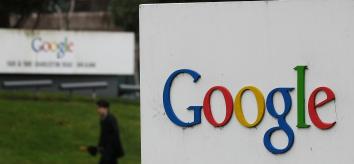This blog post is part of Future Tense, a collaboration among Arizona State University, the New America Foundation, and Slate that explores the ways emerging technologies affect society, policy, and culture. On Dec. 9, 2013, Future Tense will host an event on patent reform in Washington, D.C. For more information and to RSVP, visit the New America website.
Who has time anymore to manage their social media feeds? All the status updating, replying, and posting of smart takes on the day’s news is exhausting. Well, Google want to help you out with that: The company recently submitted a patent for software that learns how users respond to social media posts and then automatically recommends updates and replies they can make for future ones. Consider it outsourcing, for your social life—an amped up, next gen blend of automated birthday reminders and computer generated, personalized remarks (more successful Turing Test than random word salad).
Google’s already accustomed to predicting how our collectively sordid minds fill in blanks. In an age of “hyperintermediation,” it was just a matter of time before Google proclaimed it was aspiring to automate our social interactions, perhaps, ultimately, directing our email, instant messages, and texts, too.
In one sense, Google’s plan is old hat. Silicon Valley has long elevated efficiency to the highest social ideal and been guided by the mistaken conviction that the key to happiness lies in eliminating obstacles that impair productivity.
In another sense, Google’s patent takes Silicon Valley’s disregard for classical values and virtues to a new level of obnoxiousness. Using it for lightweight social interactions—cooing over the 500th baby photo posted by a friend—would be one thing. But imagine using the response prompting software to generate a choice phrase that tells your brother “you’re” sad he has cancer. Or, considering folks using it to extend “their” congratulations for other people’s accomplishments—getting promoted, married, or making a life-changing decision.
Patent applications don’t always lead to anything. The Patent Office might take years to make a decision, and we don’t know what judgment it will render. Even if Google is issued a patent, the project could very well become a bust due to artificial intelligence barriers preventing the software from being developed, or folks having the good sense to find the service absurd. And, of course, we don’t know that Google actually intends to build the technology. Just because Google is unhappy about being patent trolled over Android doesn’t mean isn’t willing to play the competitor blocking game. But the very desire to automate personal sentiment through plagiarized algorithmic authorship exemplifies disregard for too many things: the art of conversation, the sincerity of conviction, the effort required to make caring gestures, and, frankly, the respectful acknowledgement that underlies meaningful gestures of etiquette.
Google’s ventriloquist goal could be easily mistaken as a literary device in David Egger’s much discussed dystopian novel, The Circle.
In Eggers’ book, a technological behemoth “that’s like the unholy lovechild of Google and Facebook” aspires to profit handsomely from turning the ideal of privacy into the vice of selfishness. To meet this goal, it launches an assault on social norms. According to the new standard, if you keep anything yourself—whether it be an update on an ill relative or detail about an outdoor excursion—you’re behaving like a child hoarding a favorite toy. And, if you don’t respond immediately to the swarm of communication sent your way, you’re guilty of being antisocial.
The Circle has been widely criticized for getting Silicon Valley wrong. But if companies like Google get their way, someday the world will be far bleaker than Eggers imagines. He’s only worried about atrophied exchanges between folks impaired by social media. That’s nothing compared to digital doppelganger chatting away endlessly in contrived conversation.
